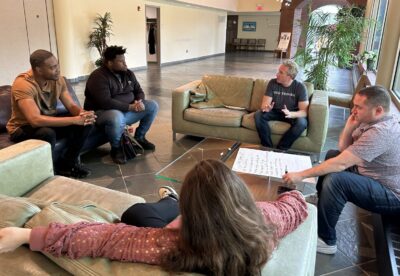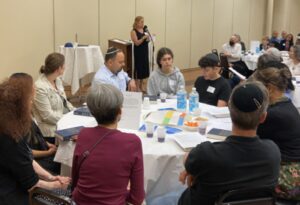
From the leafy suburbs of Millburn and Westfield to the commuter campus at Rutgers-Newark, we are witnessing a steady and disturbing rise of acts of antisemitism.
From middle school students printing parking tickets with the words “gas the Jews” to Jewish college students seeing purveyors of hate invited to campus for an American Muslims for
Palestine conference, these actions have required a swift and strategic response from Jewish Federation, including the formation of an internal response team staffed by security, Holocaust education, and community relations professionals.
With New Jersey reporting the third highest number of incidents recorded in any state across the country in 2022, we are regularly asked, what is Jewish Federation doing to fix this? How can hate be defeated?
While it’s small comfort to know that ours is not the only minority group impacted by hate, we remain the leading target. Whether small incidents like swastikas appearing on high school bathroom walls, or big ones like an attempted firebombing at a Bloomfield synagogue, we know that silence is not an option. We are in constant contact with law enforcement, school administrators, clergy, and elected leaders to advocate on behalf of our community, educate young people on the damaging effects of hate, and make sure our institutions are properly prepared and protected.
While speaking out in response to each and every event is necessary, it is just a small piece of what we do. What is, by far, the more constructive action is what we do proactively, on a daily basis, to build relationships across interfaith lines, literally strengthening the fabric of American civil society.
 This year, JCRC’s Community Leaders Against Hate and Antisemitism Committee awarded over $10,000 in microgrants to seven synagogues and community organizations, seeding projects to foster dialogue and build connections among Jews and other faith communities. The events we funded celebrated diversity, history and traditions: from liberation seders incorporating the Passover story with the African American experience of slavery to children’s programs fostering acceptance. There was a Juneteenth Shabbat (left), which explored the local history of slavery to a program bringing together religious and cultural leaders to address antisemitism today.
This year, JCRC’s Community Leaders Against Hate and Antisemitism Committee awarded over $10,000 in microgrants to seven synagogues and community organizations, seeding projects to foster dialogue and build connections among Jews and other faith communities. The events we funded celebrated diversity, history and traditions: from liberation seders incorporating the Passover story with the African American experience of slavery to children’s programs fostering acceptance. There was a Juneteenth Shabbat (left), which explored the local history of slavery to a program bringing together religious and cultural leaders to address antisemitism today.
Through JCRC’s Rekindle project, an outgrowth of our social justice work, a group of ten Jewish and African American participants met over five weeks for facilitated conversations around the black and Jewish experiences (pictured above). Our Interfaith Rosh Hashanah event and Festival of Lights in December celebrating Christmas, Hanukkah, and Hindu festivals brought more than 200 people together to meet and learn from one another.
Thanks to a substantial grant from the State of New Jersey, we will amplify our work over the coming year to reach even more people. For while we are under no illusion that programming alone will defeat the world’s oldest hatred, we know there is no substitute for human interaction to create understanding and friendship.
Put another way, the more people know us, the harder it is to hate.

